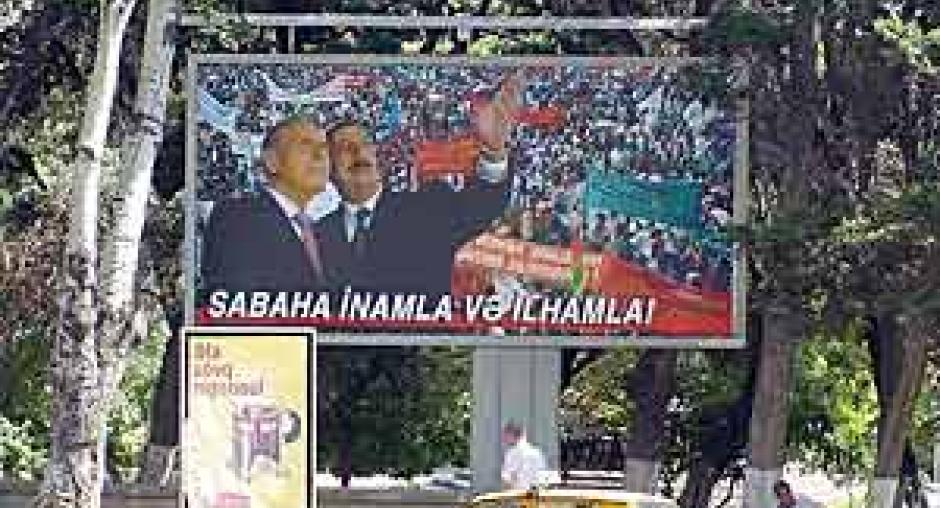Newsroom
Joint statement on presidential election in Azerbaijan
BAKU 16 October 2003

(OSCE/Ulvi Akhundlu)Scene from the political campaign for the 15 October presidential election in Azerbaijan. (OSCE/Ulvi Akhundlu) Photo details
BAKU, 16 October 2003 - Voting in the 15 October Azerbaijan presidential election was generally well administered in most polling stations but the overall election process still fell short of international standards in several respects. International observers noted a number of irregularities in the counting and tabulation.
These are the conclusions of the International Election Observation Mission (IEOM) in Baku, deployed by the OSCE's Office for Democratic Institutions and Human Rights (ODIHR) and the Parliamentary Assemblies of the OSCE and the Council of Europe. The Mission published its preliminary findings today, based on the work of some 600 observers, including more than 40 parliamentarians.
"We are worried about tensions arising from the low level of mutual trust within society," said Giovanni Kessler, Head of Delegation of the OSCE Parliamentary Assembly and Special Co-ordinator of the OSCE Chairman-in-Office for the Short-Term OSCE Observation Mission. "We urge all parties to exercise restraint. This election shows an increased vitality of political life and serious efforts in Azerbaijan towards democracy and international standards."
Guillermo Martines Casan, Head of Delegation of the Council of Europe Parliamentary Assembly, said: "We hope this election could mark the beginning of a new era in Azerbaijan in which progress could be achieved through trust, confidence-building and co-operation of all democratic forces in the country. A good development of the election process is crucial for the democratic credentials of the State. We ask all political actors to adhere to legality and democratic standards when defending their legitimate, different, political ideas."
Peter Eicher, Head of the ODIHR Observation Mission, commented: "This election has been a missed opportunity for a genuinely democratic election process. We were particularly troubled by the level of intimidation and unequal conditions for candidates during the campaign. Future progress towards democratic elections will depend first and foremost on the political will of the authorities."
Of special concern were numerous instances of violence, including on election night. In general, campaign conditions were manifestly unequal. A pattern of intimidation against opposition supporters overshadowed the political atmosphere. Access of opposition candidates to state and independent media, apart from free airtime, was severely out of balance. Opposition candidates were faced with serious restrictions on political rallies.
There were nonetheless some positive aspects. Voters had a genuine choice among eight candidates. There was an active campaign, with public participation. Opposition candidates were able to criticize the authorities. The new election code incorporated more safeguards against fraud. The Central Election Commission published immediate and detailed precinct results, as requested. This gave an unprecedented degree of transparency to the election.
The Institutions comprising the IEOM stand ready to continue their dialogue with the authorities and civil society of Azerbaijan to address the concerns arising from these elections.
These are the conclusions of the International Election Observation Mission (IEOM) in Baku, deployed by the OSCE's Office for Democratic Institutions and Human Rights (ODIHR) and the Parliamentary Assemblies of the OSCE and the Council of Europe. The Mission published its preliminary findings today, based on the work of some 600 observers, including more than 40 parliamentarians.
"We are worried about tensions arising from the low level of mutual trust within society," said Giovanni Kessler, Head of Delegation of the OSCE Parliamentary Assembly and Special Co-ordinator of the OSCE Chairman-in-Office for the Short-Term OSCE Observation Mission. "We urge all parties to exercise restraint. This election shows an increased vitality of political life and serious efforts in Azerbaijan towards democracy and international standards."
Guillermo Martines Casan, Head of Delegation of the Council of Europe Parliamentary Assembly, said: "We hope this election could mark the beginning of a new era in Azerbaijan in which progress could be achieved through trust, confidence-building and co-operation of all democratic forces in the country. A good development of the election process is crucial for the democratic credentials of the State. We ask all political actors to adhere to legality and democratic standards when defending their legitimate, different, political ideas."
Peter Eicher, Head of the ODIHR Observation Mission, commented: "This election has been a missed opportunity for a genuinely democratic election process. We were particularly troubled by the level of intimidation and unequal conditions for candidates during the campaign. Future progress towards democratic elections will depend first and foremost on the political will of the authorities."
Of special concern were numerous instances of violence, including on election night. In general, campaign conditions were manifestly unequal. A pattern of intimidation against opposition supporters overshadowed the political atmosphere. Access of opposition candidates to state and independent media, apart from free airtime, was severely out of balance. Opposition candidates were faced with serious restrictions on political rallies.
There were nonetheless some positive aspects. Voters had a genuine choice among eight candidates. There was an active campaign, with public participation. Opposition candidates were able to criticize the authorities. The new election code incorporated more safeguards against fraud. The Central Election Commission published immediate and detailed precinct results, as requested. This gave an unprecedented degree of transparency to the election.
The Institutions comprising the IEOM stand ready to continue their dialogue with the authorities and civil society of Azerbaijan to address the concerns arising from these elections.
